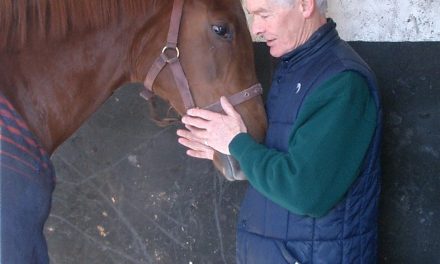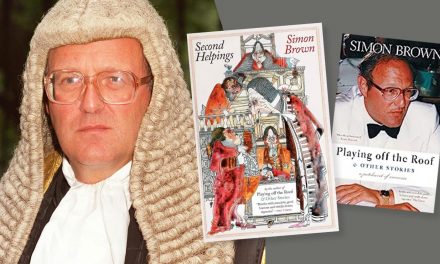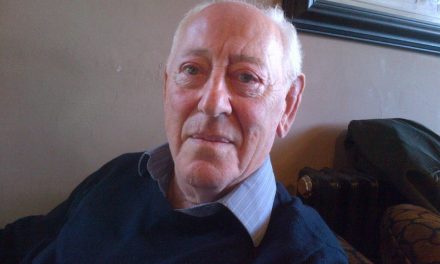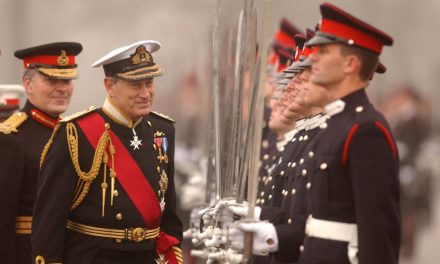I have had the joy of knowing Michael continuously from my mid-twenties, when I was at the start of my own career in the law, right up until Monday 23 May 2022. By then we had both left the legal profession, and it was his turn to host a lunch for a small group of now-retired friends. We met, of course, at his beloved Garrick. Sadly, that was our last encounter.
Throughout that time, I have known Michael as a friend, a distinguished lawyer, and an outstanding example of generosity, kindness, and true philanthropy.
Michael had been Called to the Bar by the Middle Temple in 1958, after his First in PPE at Oxford. I met him at the flat which he and Janice had in Crystal Palace in the mid-sixties, before they went on to create their wonderful home in Dulwich. By then he was well on his way to establishing his successful practice at the Bar. I too was a member of the Middle Temple, but a mere pupil at the time, apprehensive as to how my own career would shape up. It was the first time that I experienced – then at first hand – the extraordinarily open and unaffected way in which Michael counselled, advised, and encouraged newcomers to the profession. I was to witness this time and again as our professional lives progressed, and I will return to it.
As it happened, my own area of practice overlapped Michael’s to some extent, and we did have some encounters in court early on. But more importantly, my work gave me an excellent viewing platform from which I could observe the growth, status, and success of Michael’s own practice.
He joined what was originally Sir Derek Walker-Smith’s chambers in Paper Buildings in the Inner Temple and is now the prestigious Landmark Chambers, specialising in local government and planning law, and property law. At a time when the nation’s economy was growing at a pace, underpinned by major steps in the improvement of our infrastructure, Michael was one of the elite group of barristers who appeared at public inquiries all over the country, concentrating on schemes of national importance.
Michael took silk in 1980 and accumulated a band of loyal junior barristers who worked with him, to their great satisfaction. One of them has reported to me that, at times when enthusiasm at a public hearing for listening to population or transport statistics was – shall we say – flagging, he would add a vivid touch of human interest and a moment of drama by taking a pinch of snuff – a habit which Janice was finally able to ban.
The adjective ’clever’ has to be handled with care. Sometimes it is used in a slightly derogatory sense. Michael was a clever man in the best sense: rigorously analytical, probing, and inventive, seeing points which others might miss.
The high quality of his intellect emerged with even greater clarity when he was appointed to the Bench as a Circuit Judge in 1991. Within a year he was allocated to work in what was then the Chancery Division of the High Court, and in the Lands Tribunal, where his wide knowledge, experience and talents were fully deployed.
Many of my colleagues appeared before him. Two things stand out: first, his highly astute appreciation of the case before him, challenging, questioning, unravelling potentially difficult problems. Secondly, his extreme courtesy and kindness to counsel appearing before him, but always – let it be known – on the strict condition that they did not take manifestly bad points. He was especially courteous to new recruits to the Bar. One of my now very successful colleagues vividly remembers being invited into his room in court at the end of a case very early in her career. She was full of apprehension; but he simply wanted to congratulate her on her advocacy and offer her some friendly advice on how she could improve her skills. Very few judges would even think of doing that.
This leads me finally to the contribution which Michael made to the work of the Middle Temple, and I must incorporate into this tribute the warmest thanks of the entire Inn for the unremitting support which he provided to its activities.
You will know that the four Inns of Court – Lincon’s Inn, Gray’s Inn and the Inner and Middle Temple – are collegiate societies of ancient origin. All would-be barristers must join and be Called to the Bar by one of them. The Inns are governed by senior lawyers called Masters of the Bench, or Benchers. A core mission is to recruit, support financially and collaborate in the education and training of young practitioners.
Michael was appointed as a Bencher of the Middle Temple in 1985 and straightaway immersed himself in that part of our work. One of our projects in the Middle Temple is our ‘Access to the Bar’ scheme. We invite students from around the country, mainly from less well-off backgrounds, to come to London at our expense to observe the work of the Bar and the courts for a week, to see if they might like to make that their career. Quietly, unobtrusively and with typical generosity Michael would invite one or two of our visitors to stay with him in London, make sure they were properly fed for the day, dine with him at the Garrick and take them to the theatre. It was an experience they never forgot.
In 2006, he was appointed to the position of Reader, imposing special obligations in the oversight, and mentoring of Bar students. On recruiting drives around colleges and universities he memorably and with typical irony would open proceedings by saying ‘I am Master Reader of the Middle Temple. 500 years ago, that was the most important job in the Inn.’ In fact, it has never been so important. In the required lecture he gave to the Inn at his Reader’s Feast in November 2006 he combined, as only Michael could, a love and deep knowledge of the theatre with the practice of advocacy as playwrights have attempted to portray it, cleverly – I say it again – identifying through this unusual lens the hallmarks of skilful and ethical court practice.
For his troubles he earned the right to display his coat of arms in the Inn, with that famous motto.
I was particularly fond of Michael’s old-school style of dress and speech, and his pretence of not knowing something which he knew perfectly well. I regarded all of that as a cunning disguise of a sharp, critical, and incisive mind. He was a man of warmth, kindness, and high moral values. There are many present today who will, of course, miss him more than I do. But it is a blessing for me to have counted him among my friends. And I will miss him.
Eulogy reproduced with thanks to Master Derek Wood




